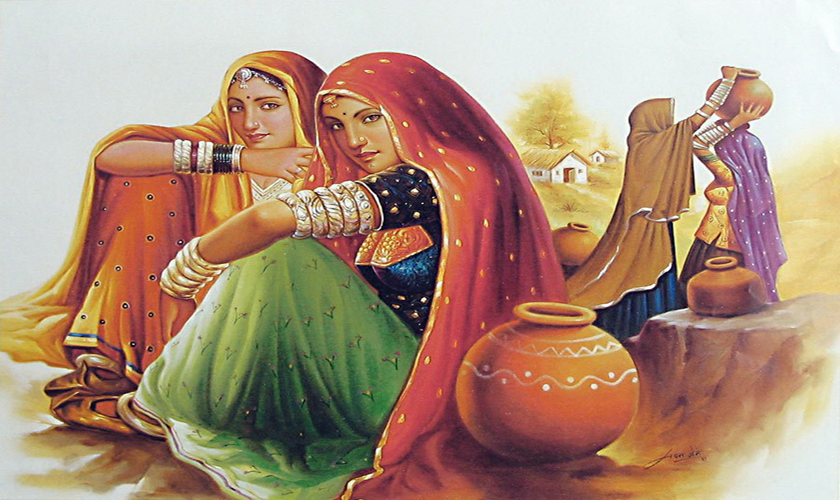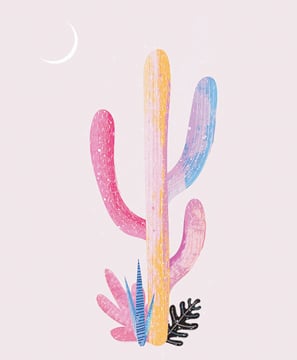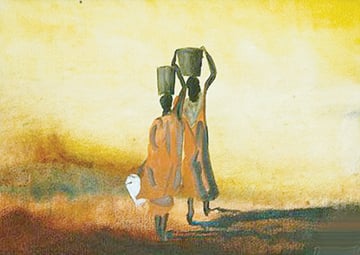Siddu had often wondered what it was like to have a heart. She didn’t have a heart, she was sure, because hearts hoped and wished and wanted, and Siddu had never hoped or wished or wanted. All Siddu did was what she was told.

When her father became sick and the doctor from the army’s medical camp came to their house on a jeep three miles into Thar to visit their little mud house, he told Siddu, “Your father will not be able to move again; all you can do is wash him, feed him, and take care of him as well as you can by yourself. Will you do it?” Dumbly, Siddu had nodded. What else could she do?
When the old men of the village had gathered on her father’s funeral and told her, “You must marry someone, Siddu Bibi; good women do not live alone in houses, they need an anchor, a man.” Siddu had nodded dumbly. What else was there to do?
When her groom stumbled onto the decorated chair beside her and wished the village Mullah good day in a voice slurred with cheap home-made wine, Siddu bowed her head and said, “I do.” What else could be done?
Living thus, it was right for Siddu to wonder what it was like to have a heart, and it was right to know that she didn’t have one; but all this changed the day she found little Nimu in the bushes near the well.
It had been twilight, and Siddu, tired from the day’s work in the well owner’s house, was stumbling towards the well to pull up the pitcher-full of water she had earned when she heard a sniveling noise from the bushes.
For a second, she had stood quite still remembering all the ghost stories the village girls told each other of the pichal-peris that roamed around after dark in the open desert, looking for humans to haunt. She tried to remember the holy verses Rehmat Bibi had beaten her into memorizing as a child, but none came forth at this time of need. Cursing her memory, Siddu turned to run back to the village that was two miles away from the well, but the idea of her husband’s reaction on her returning without water was more terrifying than the idea of a pichal-peri worming its way into her soul. Resolutely, she stomped her way to the well, her lips pursed tightly, her jaws clenched.
She tied the old rope around her pitcher and lowered it into the well, her heart beating in her throat. She thought she heard something behind her, a rustle, dull footsteps... she didn’t turn around. If you turn around when a pichal-peri is coming to get you, you turn to stone. But she would have to turn around eventually, because her village was behind her. The very thought of turning around to face a red-eyed woman with heels instead of toes on her feet made Siddu tremble, but she pulled her pitcher up, untied the rope, and clutched the precious pitcher to herself. That was when she realized the weeping had ceased. Instead, there was a deep, ragged breathing coming from a mucous filled throat.
Turning around slowly, Siddu scanned the area. There was no red-eyed woman in sight. The breathing came from the bushes, and this time, with a slightly clearer mind, Siddu heard the sickness in the sound, and understood this was a human, and no mythical witch. Putting her pitcher down on the sand, she walked briskly to the bushes and parted them.
Among the thorns lay a child - a very human child.
Exclaiming loudly, Siddu knelt down and picked her up, covering her bare body with a corner of her head cloth. The child’s face was covered in dust and dirt, the corners of her eyes were lined with grime, her body was shivering; on this warm evening, it was ice cold. Her hair was unkempt, caked with mud and knotted all over her little skull like the huge grey carpets in the well-owner’s house, except the hair, unlike the carpets, was not soft, it was stiff with filth.
As soon as she touched her, the child took up its crying again. Crooning softly, Siddu held the grungy creature to her shoulder, patting her back softly.
 For a few moments, as the child slowly quieted, Siddu found herself debating what to do with her. She put the little girl down on the sand and stood over her thoughtfully. She knew why a child of five had been dumped in the bushes, left to the merciless heart of Thar. It had to be the same story the desert had witnessed several times: dead parents, poor relatives, and the water that could not be spared for a sickly orphan.
For a few moments, as the child slowly quieted, Siddu found herself debating what to do with her. She put the little girl down on the sand and stood over her thoughtfully. She knew why a child of five had been dumped in the bushes, left to the merciless heart of Thar. It had to be the same story the desert had witnessed several times: dead parents, poor relatives, and the water that could not be spared for a sickly orphan.
For a few minutes, she stood there, contemplating the dirty child in her arms. Then a thought, unbidden yet thrilling, slunk its way into her head.
She should wash it... with water.... from the well.
She clutched her chadar, her heart beating fast. She couldn’t waste her day’s water on this child! Could she?
But she needn’t.
She stole a glance towards the well, and another glance at the surrounding desert. No one would know.
The well-owner trusted her. She had never stolen water before, she never would again, but stealing it only once was enough for a death sentence from the village elders. When a villager steals water, the entire village loses the well-owner’s trust, and consequently, the well. It was too large a loss to be sustained.
She remembered Rehmat Bibi’s throaty voice declaring “Those who steal will have their hands chopped off by the decree of Allah and His Prophet!”
Siddu needed her hands severely. If someone cut off her hands, how in the world was she to clean the well-owner’s home and earn her daily share of water?!
The assertion was correct, but despite its correctness and the great need Siddu had for her hands, the well was still there, the dirty, sick child was still there, and Siddu was still standing alone in the desert, clutching her pitcher, with the water sparkling silently in the well, almost as if waiting for her decision too.
Siddu bent down almost timidly, and her hand shook unashamedly as she wetted a corner of her chadar in her pitcher, and started scrubbing the child slowly.
The scrubbing, cleaning and drying went on until most of the grime on the girl’s body had been washed off, and then Siddu, not knowing what else to do, tied her into her chadar and picked up the empty pitcher. It suddenly seemed to weigh more than a full one. Resolutely, with an extremely righteous air about her, she walked exactly four steps away from the well.
Then she turned around, put the girl on the ground, and walked swiftly back to the well.
She tied the rope around the pitcher, lowered it into the darkness, pulled it up sloshing with water, tucked it on her hip and began walking home quickly.
Her body was shivering, but it wasn’t from the chill in the evening breeze.
*****************************
When her husband first saw the little girl tumbling out of Siddu’s chadar onto the sleeping mat, he felt an immediate hatred towards this thing that had been brought into his life to share his food and water. He stood in the corner of the mud house, ignoring Siddu’s imploring looks and beseeching words, and looked at the little child with unmasked animosity.
“Whose is it?” he growled.
“I don’t know,” Siddu said in a low voice, handing him the pitcher to drink from. He took a long swig of water, then prodded the child with his toe.
“Why did you bring it here?”
“It was dying in the bushes,” Siddu replied in an even lower voice.
“You wanted to see it dying here?” he asked harshly, holding the pitcher to his heart. He could not share his water. Didn’t he already share it with his wife every day?
Siddu looked at the dusty floor silently, her mind whirring, stuck on the first part of his question. “You wanted -”
What had happened to her? How could she have wanted? Had she truly wanted?
Siddu’s soul groped around inside her chest, looking for the hole where her heart should have been, and suddenly, Siddu’s entire body had stiffened. In the dank, dusty hole inside her chest, something was growing, something that dared to want.
Siddu wanted the little baby girl.
Siddu looked at her husband, her sunken cheeks aglow with something new, something that had never appeared there before.
“I wanted to help her, that’s all.” There was a new lilt in Siddu’s voice, a new song in her words. Wanting felt wonderful!
Her husband looked at her uncomprehendingly. “Help? Help? We need help. We need help! Not - not this! We are in dire need of help! I.... I’m here for you! What am I here for? You help me if you want to help! Not... not this!” Unable to form coherent sentences anymore, quite shocked by the heathenish statement of his wife, the man kicked the child sharply and gulped the rest of the water down quickly, as if afraid the little child would suddenly thrust up a hand and pull the pitcher away from him. Then he set the now-empty pitcher down and walked out of the house, furious.
This was the first and last time her husband noticed the little girl. After this episode, the girl became a minor Siddu that lived in the mud house with him, but went unnoticed except when an object to be beaten or insulted was required, and then played the role very well.
Siddu, her own lips parched with thirst, rubbed the sides of the pitcher with her chadar, and squeezed the cloth to trickle life-preserving droplets of water into the baby’s throat. After a few long minutes, the child gurgled for the first time, and pointing to the pitcher, said in a voice blurred with fever, “Nimu!” which was probably her word for water. That was how little Nimu got her name.
*****************************
Nimu was nursed back to health by Siddu and Siddu’s childhood teacher, the widow Rehmat Bibi. In a few weeks, Nimu recovered enough to be able to go with Siddu to the well-owner’s house every day.
Nimu was patient, intelligent and silent. She rarely made a sound other than breathing or snoring, but Siddu was sure she would learn to express herself clearly someday, even though Siddu had never learnt to “express herself clearly” after living for twenty eight years. Rehmat Bibi estimated Nimu was six at least, but had stunted growth. In Siddu’s affectionate eyes, Nimu was four years old, but appeared bigger than her years.
Siddu never realized the difference Nimu had created inside her, until one day when the well-owner’s wife said to her, “That girl you found in the desert will grow up strong, I think.” And Siddu had answered, “Yes, Bibi Sahib, I hope she does,” and then Siddu had stood for a half minute, looking at her reflection in the mirror, marveling at the dank, cobwebbed hole that had started daring to hope too.
She turned to look at the little child sitting silently in a corner of the huge drawing room, and felt a strong rush of something she had never experienced before, and couldn’t either name or understand.
For a few minutes, Siddu stood there trying to stop this beautiful golden glow rushing around inside her veins wreaking havoc in the ruins nestled in her chest since birth, but then she walked over to Nimu, gathered her up in her thin arms and kissed her forehead.
*****************************
She had learnt to want and hope and wish, and this made Siddu afraid. She had never wanted before, and neither had she hoped, but once it had started, she couldn’t stop it.
She wanted better clothes for Nimu all of a sudden, and she wanted a little brick house for herself. She wanted water that came miraculously from taps like the ones in the well-owner’s home, and she wanted her husband to work in the well-owner’s home like some other village men did.
Wanting was not dangerous, until she started hoping for all of these.
Siddu did not understand that she had been born in Thar - dry and cruel Thar. Thar disliked wishes and desires. They conflicted with reality.
“Bibi Sahib,” Siddu said to the well-owner’s wife one day, in a low but firm voice. “Bibi Sahib, can I ask you something?”
The woman, who was rubbing something on her face busily, grunted. Siddu took it for approval.
“Bibi Sahib, I was thinking, I was...” Siddu looked at the carpet, her eyes clouding over with the new rush of desires and hopes that had started marching around in her head these days. “I was thinking, perhaps you could pay me half in money and half in water?”
“Half in money?” the woman exclaimed, looking at her quite aghast. “What do you want money for?”
To be continued...